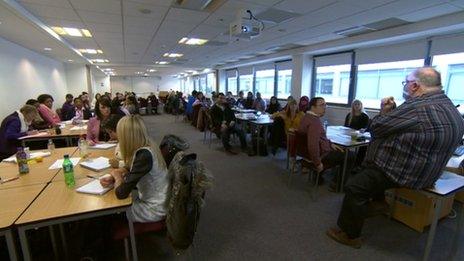Birmingham City Council Children's Services to get commissioner
- Published

A serious case review into the death of Keanu Williams in January 2011 heavily criticised all agencies involved in his care
Birmingham's Children's Services - rated "inadequate" for the past four years - is to get an external commissioner to oversee the running of the unit.
There have been 20 investigations over child deaths, external since 2007, though not all were known to social services.
Children's minister Edward Timpson said former health minister, Lord Norman Warner, will be the new commissioner.
The appointment follows a report, external handed to ministers last month.
'Challenge and support'
Under the plans announced by the Department for Education (DfE), the local authority will still retain control of its children's services.
Birmingham has seen several serious case reviews in recent years
Between 2007 and November 2013 there were 20 serious case reviews in Birmingham, external, following the deaths of youngsters like Khyra Ishaq in 2008 and Keanu Williams, in 2011.
A peer review in February suggested improvements were being made in the department and a £10m investment plan was announced by the council in December.
Mr Timpson said however, he remained very concerned about the safety of children in Birmingham.
He said an independent panel of experts would also be set up to "challenge and support" the city council.
Council leader Sir Albert Bore said he welcomed the recommendations and the report set out a "compelling account of the reasons for, and the lengthy history of shortcomings".
"In doing so, it also highlights the significant challenges that come from the scale of deprivation facing communities in Birmingham," he said.
Commenting on his appointment, Lord Warner said vulnerable children in Birmingham deserved "to receive the care and protection that they can rely on when the responsible adult has failed them".
He said he would work with the city council to put in place the "immediate improvements needed".
The commissioner is expected to work alongside but independently of the council, supported directly by the DfE.
Labour peer Lord Warner was a health minister from 2005-2007 and Parliamentary Under-Secretary in the Department of Health from 2003-05.
'History of failure'
Birmingham City Council is currently the subject of an Ofsted inspection, expected to be published in May.
The council's director of people, Peter Hay, said the authority "fully expect[s] to remain inadequate" according to the findings of the inspection, but the report had given it greater clarity on how to make improvements.
"This time, we face this inadequate judgement with the clarity given by this report about what is going to be different and how we make change and improvement stick," he said.
Mr Hay added the report suggested "low-risk" measures to aid the "fragile" recovery.
"Given the prolonged history of failure and the fact there are green shoots of a recovery, albeit a frail one, now is not the time for high-risk options," he said.

Lord Norman Warner will oversee attempts to improve Children's Services
Cabinet member for Children and Family Services, Brigid Jones, said the report was "comprehensive, accurate and honest".
"What this report shows is that we must stick to our long-term improvement plan and not be dragged back into the short-term thinking that saw us making knee-jerk changes as a response to every poor Ofsted inspection," she said.
The report identified "a long-standing under-investment in children's services" and a "stand-alone culture" within the department.
It said: "For a variety of reasons, over many years the corporate/political centre appears not to have paid enough attention to the department and to the service that it was delivering."
The report's authors also identified a department "haemorrhaging social workers" and, until recently, disjointed management with senior staff leaving and posts remaining vacant.
They added the council may also face the problem of "possible unidentified risk to vulnerable children".
"There may be many children in Birmingham at risk who have not been properly identified as such, or, if they have been, their risks have not been properly addressed," they said.
The council said Professor Julian Le Grand's report had identified a possible nationwide shortage of social workers.

Birmingham City Council's Children's Services department has repeatedly come under fire because of several high-profile child deaths
It said figures showed it took five years to train a social worker but the average length of service was seven years.
Labour MP for Perry Barr, Khalid Mahmood, said the "halfway house" decision not to remove control of children's services from the council and install a commissioner was a "better way" to approach the problems.
"It allows the council to build on the pace and build on the knowledge that's happening, it's about working together [with central government] and building for the future," he said.
Mr Mahmood agreed there was a sense of "report fatigue" in Birmingham, after earlier reviews of children's services did not seem to yield improvements that were called for.
"We need to ensure when the report comes back in April that we are able to review it and see how it goes," he said.
- Published21 March 2014

- Published18 March 2014

- Published11 February 2014

- Published14 December 2013

- Published3 October 2013

- Published29 November 2013

- Published15 November 2013

- Published12 November 2013

- Published15 October 2013

- Published4 October 2013
